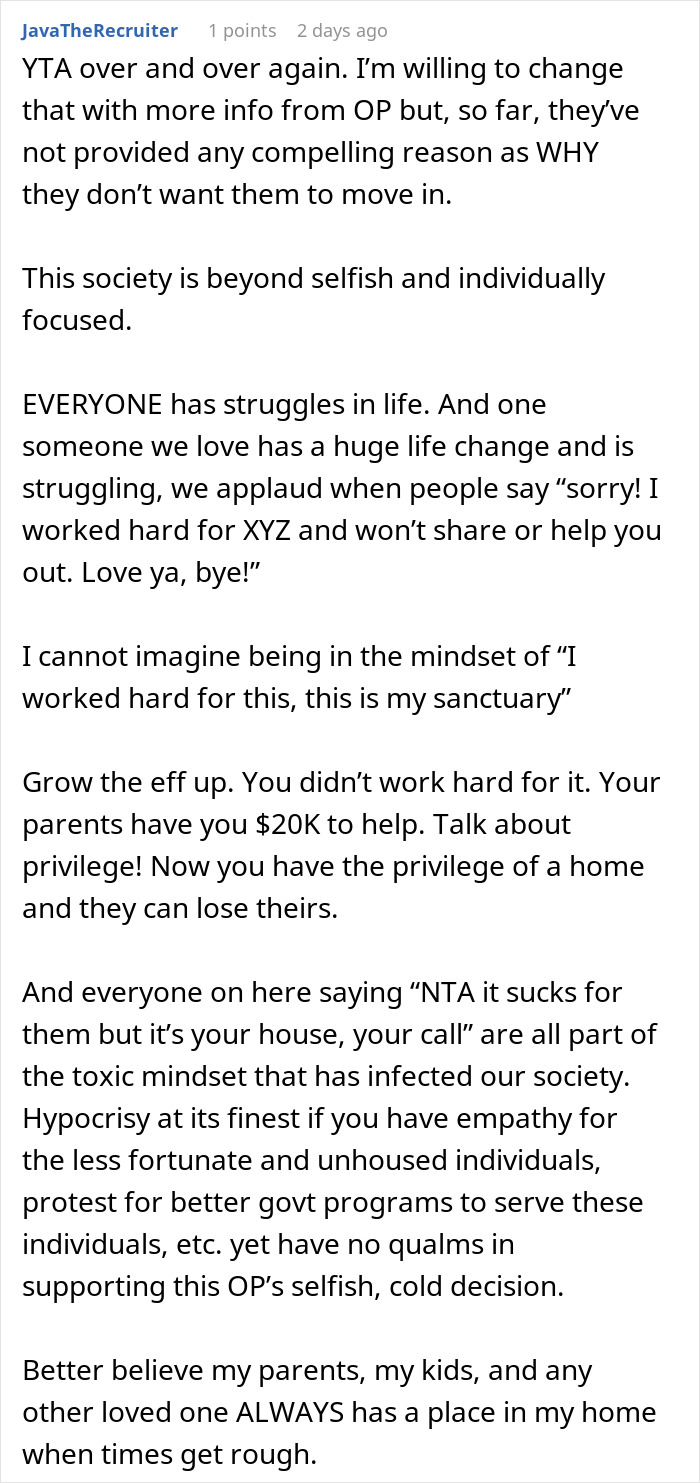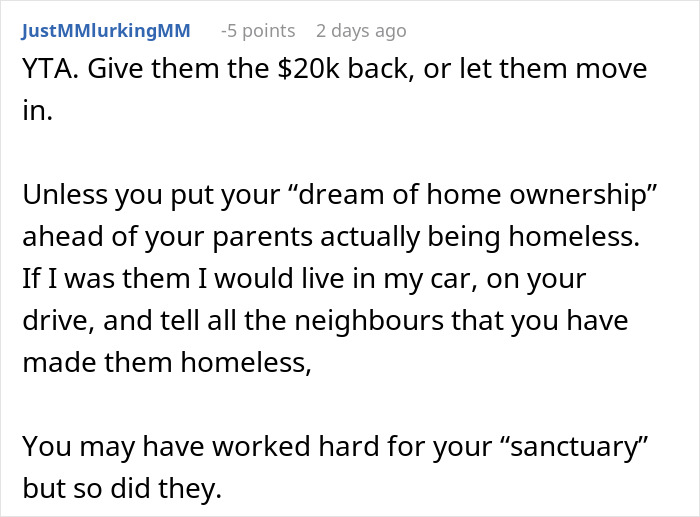A parent’s relationship with their child is primarily based on selflessness, or at least it should be. When people choose to have a kid, they should be ready to put their needs before their own. However, some tend to see this relationship as transactional, anticipating an equal exchange for their efforts and investments.
When this redditor’s parents helped him buy a house, the money they gave him was supposed to be a gift—no strings attached. But after a year of settling into the home, they announced they’d be moving in for an indefinite amount of time, as they were having some financial struggles.
Scroll down to find a full story and a conversation with Joy Loverde, keynote speaker on elder care and solo aging, and best-selling author of The Complete Eldercare Planner, 4th Edition, Suzanne Asaff Blankenship, elderly care expert and author of award-winning book How to Take Care of Old People Without Losing Your Marbles, and Jennifer Fink, elderly care podcast Fading Memories host, who kindly agreed to weigh in on the situation with their expert insights.
When parents help their children, they don’t expect anything in return

Image credits: senivpetro / freepik (not the actual photo)
However, these parents anticipated equal exchange after they contributed financially to their son’s home purchase

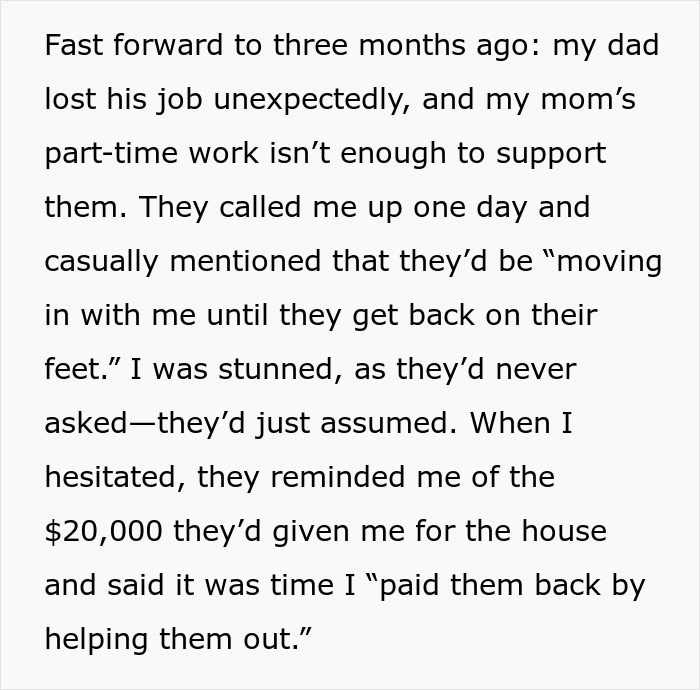

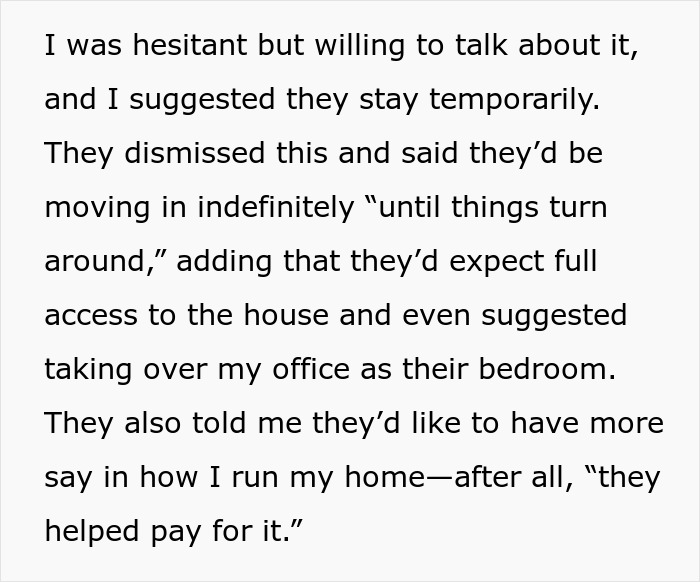
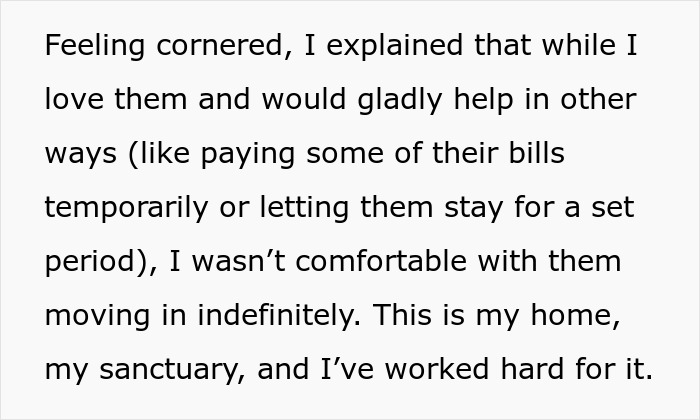


Image credits: freepik (not the actual photo)
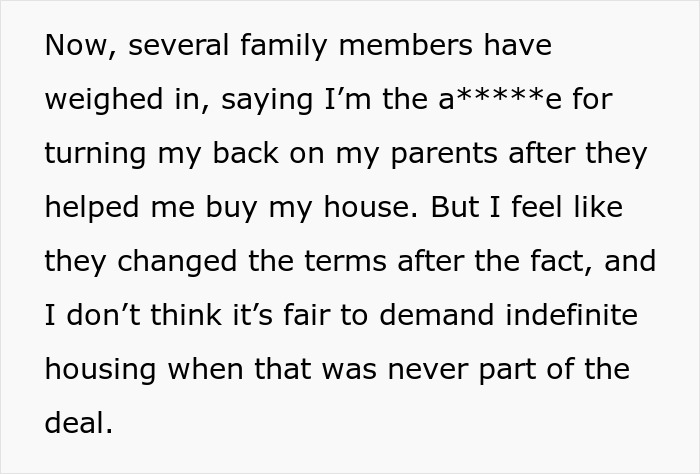

Image credits: ytys45
Experts weigh in on the parents wanting to move in

Image credits: freepik (not the actual photo)
Suzanne Asaff Blankenship, elderly care expert and author of the award-winning book How to Take Care of Old People Without Losing Your Marbles, says that the son is right to question such a demand from his parents. “If the initial $20K was a gift and was given as such, then there needs to be a discussion about that. I would recommend that the adult child offer to see a mediator or family therapist to help work out a good solution,” she says.
The expert notes that the communication this family currently has is definitely not working. Therefore, they need to set some boundaries to decide whose home it is and who makes decisions associated with it. “The parents seem to be still “parenting” as though they have complete control over their adult child. It is possible to work out a plan and a schedule for getting parents back on their feet, with perhaps a short stay in their adult child’s home. There are mediators, therapists, and financial advisors who can help be the independent voice in this situation,” Blankenship says.
Joy Loverde, keynote speaker on elder care and solo aging, and best-selling author of The Complete Eldercare Planner, 4th Edition, recommends taking a step back, looking at the facts, and emphasizes the importance of working on establishing healthier boundaries.
“The warning signs are there,” says Jennifer Fink, elderly care podcast Fading Memories host. “They want to take over his home indefinitely and think they should be in charge. I think the offer to help out with their bills was a good one and they can either stay the course or, if they are really concerned about permanently damaging their relationship, I’d have a sit-down and go over all their expectations (demands) and see if you can negotiate something fair and reasonable,” she advises.
Something she believes the son should be aware of is that once the parents move in they likely won’t move out. “If they plan to marry and have kids, how will that work? I do like the idea of paying them back. The original poster will have to decide what is more important. A close relationship with their parents, or 1—% independence. It doesn’t look like they’re giving them alternatives. They’ve destroyed their relationship with them over money. This story is why I suggest people think long and hard, and have MANY conversations with their parents BEFORE making a decision one way or another,” she stresses.
“If the adult child does not want the parents to live there, I’d suggest investigating a home equity loan to return the $20K and/or offering to supplement their housing/living cost as a form of repayment,” agrees Blankenship.
“It is not wrong for there to be hesitancy about the aging parent moving into the adult children’s home”

Image credits: zinkevych / freepik (not the actual photo)
“It is not wrong for there to be hesitancy about the aging parent moving into the adult children’s home,” says Blankenship. “This is the adult child’s private territory; it’s their place of refuge. Giving up that privacy and/or that refuge is a BIG deal and needs to be a very well-thought-out decision. Lots of communication, lots of hard questions to answer.”
The adult child who wants to thoroughly think about this decision shouldn’t feel guilty, as it isn’t a simple yes or no answer. While having aging parents live with you can be a rewarding experience, there are also times when it can be stressful and challenging, so both parties should be 100% on board and ready to face them.
Fink also urges to look at this through the aging parents’ perspective. “They are still the parents, that’s a role that doesn’t go away. They’re used to being independent and in charge of their own lives. Losing some or a lot of that independence or control is very difficult.”
In addition, she encourages evaluating the overall child and parent relationship before making a permanent decision. “If things were difficult when you were a teen, it’s very likely you’ll have abundant challenges unless you discuss everything BEFORE making the decision to move them in with you. You are adding another adult to your household, an adult with opinions, experiences, and needs to your family, You need to figure out, together, how you will make that adjustment as seamlessly as possible.”
Lastly, Loverde concludes by saying, “Be realistic. Living with your parents may not work out well in the long run. Have honest discussions upfront that include everyone who is affected by this living arrangement. There will be a major shift in lifestyle as well as in the family structure.
Talk about all of the ways this living arrangement can backfire. Have this conversation with your family as well as your parents before you ask them to move in. Create a Plan B ahead of time to make sure everyone is on the same page and understands when it might be time to make a change.”
The author provided more information in the comments
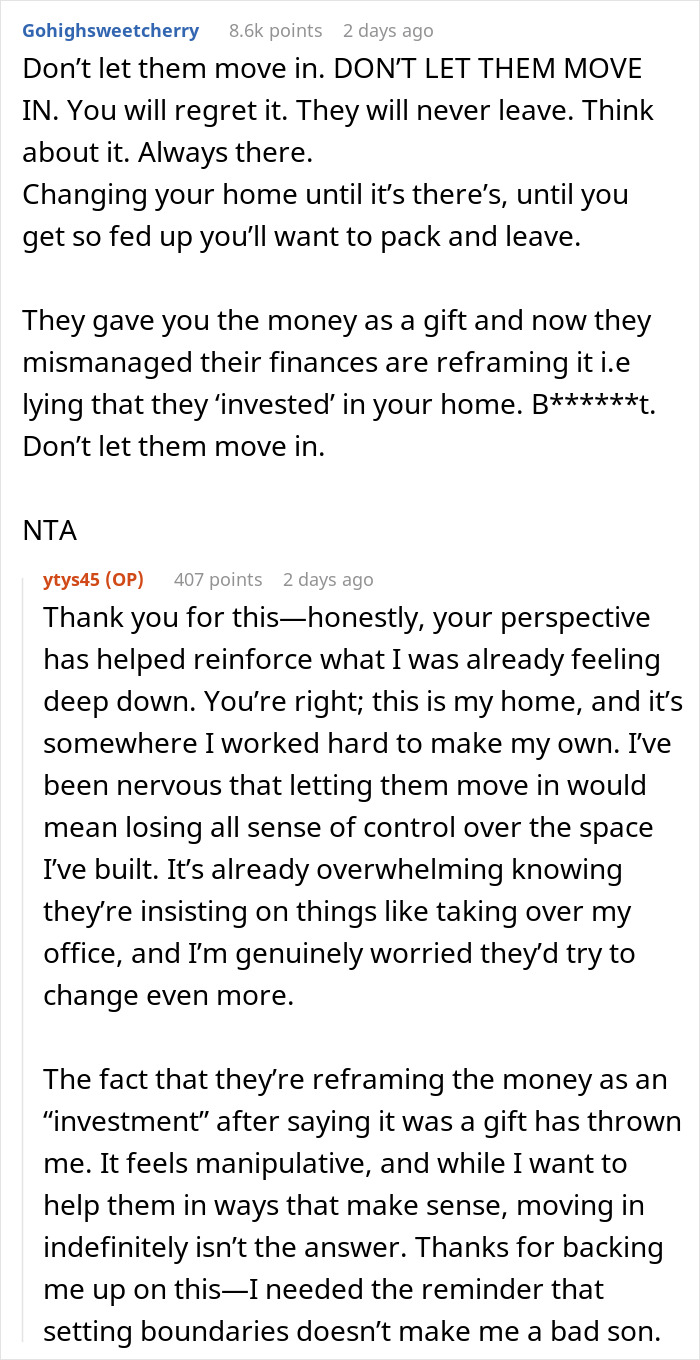

Some readers thought the author was right for refusing to let his parents move in



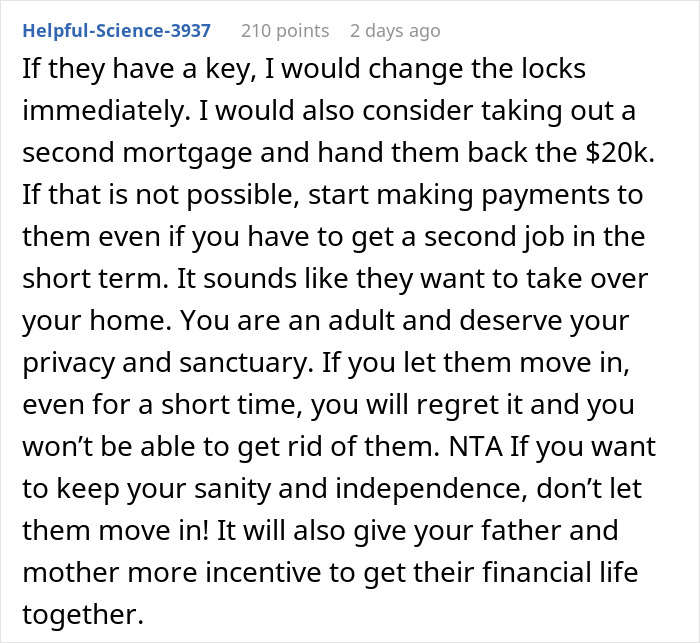



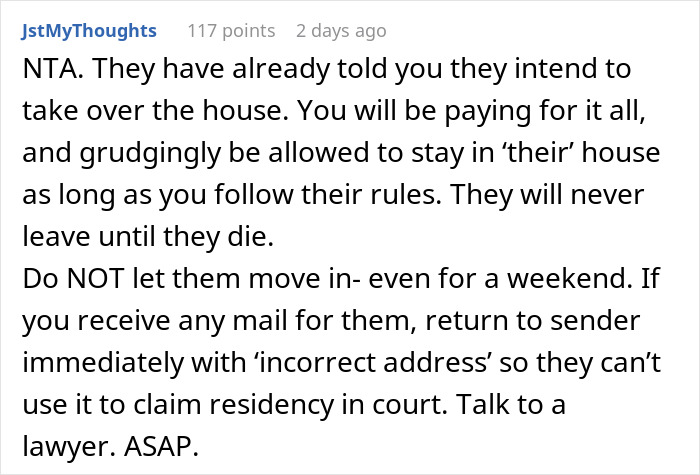

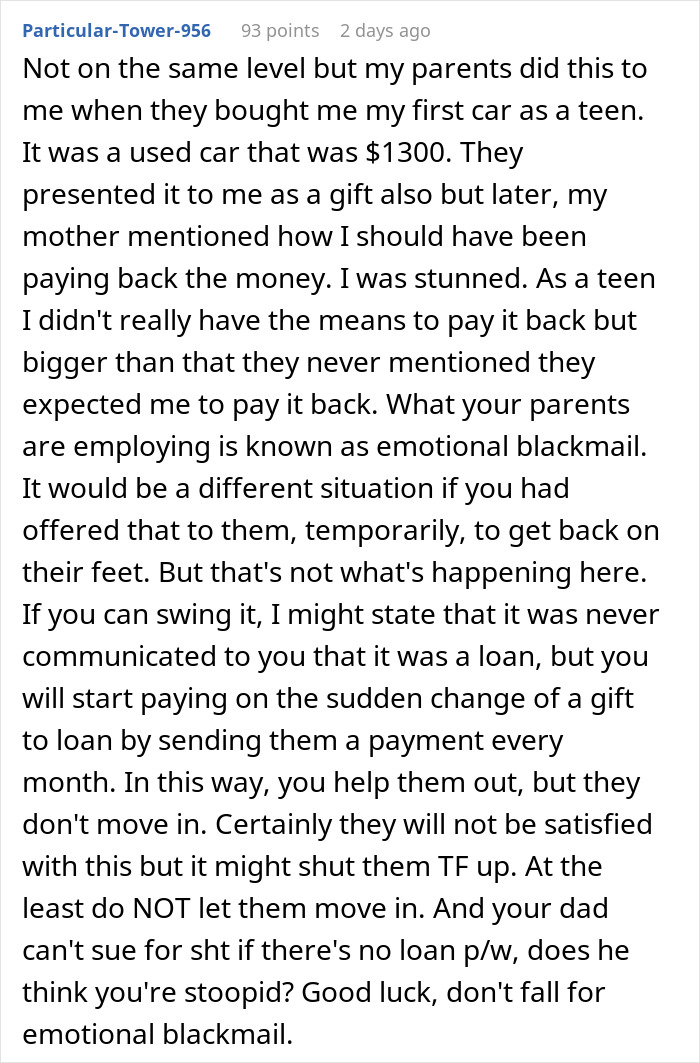










While others believed he was selfish and ungrateful
